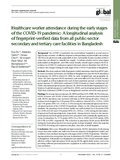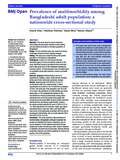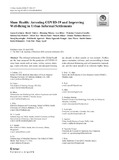Browsing by Subject "Global health"
Now showing items 1-6 of 6
-
The global burden of women's cancers: a grand challenge in global health
(© 2017 The Lancet, 2017-02-25)Every year, more than 2 million women worldwide are diagnosed with breast or cervical cancer, yet where a woman lives, her socioeconomic status, and agency largely determines whether she will develop one of these cancers ... -
Healthcare worker attendance during the early stages of the COVID-19 pandemic: A longitudinal analysis of fingerprint-verified data from all public-sector secondary and tertiary care facilities in Bangladesh
(Journal of Global Health, 2020-12-01)Background The COVID-19 pandemic has overwhelmed hospitals in several areas in high-income countries. An effective response to this pandemic requires health care workers (HCWs) to be present at work, particularly in low- ... -
How many hours do people sleep in Bangladesh? a country-representative survey
(© 2016 Blackwell Publishing Ltd., 2016)This study investigated total sleep time in the Bangladeshi population and identified the proportion of the population at greater risk of developing chronic diseases due to inadequate sleep. Using a cross-sectional survey, ... -
Making a commitment to ethics in global health research partnerships: a practical tool to support ethical practice
(© 2015 Kluwer Academic Publishers, 2015)Global health research partnerships have many benefits, including the development of research capacity and improving the production and use of evidence to improve global health equity. These partnerships also include many ... -
Prevalence of multimorbidity among Bangladeshi adult population: A nationwide cross-sectional study
(BMJ Journals, 2018-11-28)Objective This study aimed to report prevalence and evaluate the association between multimorbidity and associated risk factors in the adult population of Bangladesh. Design A cross-sectional study was conducted using ... -
Slum Health: Arresting COVID-19 and Improving Well-Being in Urban Informal Settlements
(Springer Link, 2020-04-24)The informal settlements of the Global South are the least prepared for the pandemic of COVID-19 since basic needs such as water, toilets, sewers, drainage, waste collection, and secure and adequate housing are already in ...



